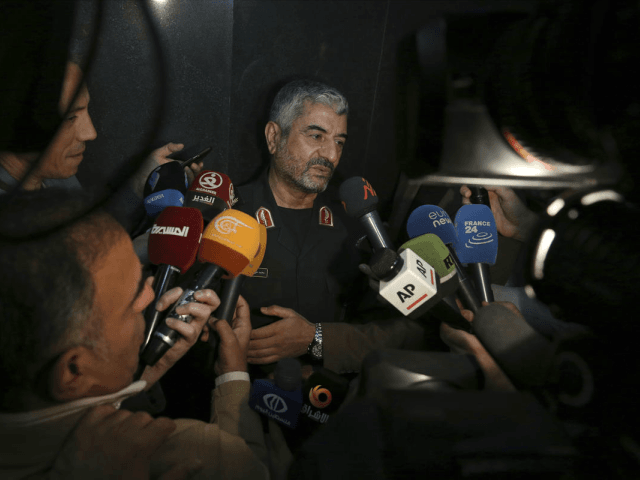Iran’s Islamic Revolutionary Guard Corps (IRGC) chief, Major General Mohammad Ali Jafari, called Trump an “amateur politician” on Tuesday and declared that Iran’s leaders will never meet with U.S. President Donald Trump, one day after Trump’s second offer to meet with Iran’s President Hassan Rouhani to “make a real deal” between the United States and Iran.
Iran’s state-run Fars News Agency tweeted that Jafari said, “Iranians never allow their authorities to negotiate with the Great Satan,” referring to the United States:
In October, Iran’s Foreign Minister Javad Zarif tweeted that “Iranians—boys, girls, men, women—are ALL IRGC” less than 24 hours after the U.S. Department of Treasury officially sanctioned the Islamic Revolutionary Guard Corps (IRGC) as a terrorist organization. The IRGC is known as Sepah-e Pasdaran-e Enqelab-e Eslami in Persian.
Many Iranians disagreed and rejected Zarif’s claim, creating the #WeRejectIRGC hashtag on Twitter in response.
Jafari is the same commander who said in November that Iran does not need to extend its range of missiles because the Islamic Republic already has the ability to reach far enough to strike American forces deployed in the Middle East if the nation is faced with U.S. aggression.
“There is the capability to increase this range, but it is sufficient for now as the Americans are present within a 2,000-kilometer radius around the country, and would get a response in the case of any invasion,” Jafari said during a Tehran-based conference titled “A World Without Terror.”
A month before that, in October, Jafari warned President Trump that if he proceeds with his “stupid decision” to label the IRGC as a terror group, the Islamic Revolutionary Guards will treat the U.S. military around the world as their Islamic State (ISIS/ISIL) enemies and come back with a “crushing” response.
The next day, on October 13, President Donald Trump announced that he had authorized the U.S. Department of Treasury to sanction the IRGC as a terrorist organization under terrorism Executive Order 13224, a move Trump said was “long overdue.”
Last week, Jafari told Iran’s state-run Tasnim News agency that the oil sanctions the United States is threatening on Iran “can be easily answered” by the IRGC. “If the current capabilities of the Revolutionary Guards … reaches the ears of the adventure-seeking president of America, he will never make this kind of mistake and will reach the understanding that an oil threat can be easily answered,” Jafari said.
The day before Jafari’s dire warning, Iran’s Armed Forces Chief of Staff Major General Mohammad Bagheri reportedly said that the United States should not threaten Iran because it would receive a “strong, unimaginable and regrettable” response.
The United States Treasury Department has warned it will impose sanctions on every country that failed to stop importing oil from Iran after the November 4 deadline it has set. The November deadline is likely symbolic as it was between November 4, 1979, and January 20, 1981, that 51 American diplomats were held hostage for 444 days in what became known as the Iranian hostage crisis.
The escalation in rhetoric also resulted in strong words from Iran’s President Rouhani, who last week said, “America should know peace with Iran is the mother of all peace” and “war with Iran is the mother of all wars.”
Trump responded to this threat with a tweet reading, “Never, ever threaten the United States again or you will suffer consequences the likes of which few throughout history have ever suffered before.”
Adelle Nazarian is a politics and national security reporter for Breitbart News. Follow her on Facebook and Twitter.



COMMENTS
Please let us know if you're having issues with commenting.